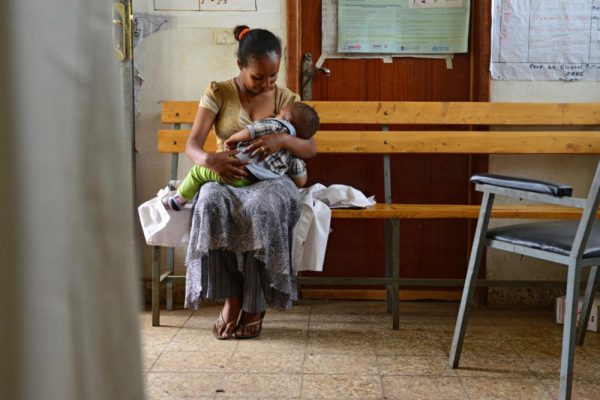The Federal Ministry of Health says in spite of the health and economic benefits of exclusive breastfeeding to mother and child, only 24 per cent of infants are exclusively breastfed in Nigeria.
Mrs Chimay Thompson, the Assistant Director, Nutrition Division, Family Health Department in the ministry disclosed this in an interview with the News Agency of Nigeria (NAN) on Thursday in Abuja.
Thompson said exclusive breastfeeding for the first six months of life without water, infant formula, liquid or food had proven to save lives, improve women and children’s health and boots lifelong productivity.
She said Nigeria is predominantly a breastfeeding nation with 97 per cent compliance.
Read Also: Difficulty in breastfeeding: Paediatrician urges mothers to seek medical advice
However, Thompson said millions of mothers and infants were now losing the benefits as only about 23.7 per cent of infants less than six months were exclusively being breastfed.
“The nationally accepted document which is the multiple indicator cluster survey states that we are presently at 23.7 per cent on exclusive breastfeeding in the country.
“This is not encouraging and if we have to achieve the National Strategic Plan of Action on Nutrition by the health sector plan, we are supposed to achieve 50 per cent in 2018.
“However, we are partnering with development partners such as Save the Children, Alive and Thrive and we will achieve our goal,’’ she said.
Read Also: Ophthalmologist warns against use of breast milk, urine on babies’ eyes
Further highlighting the benefits of exclusive breastfeeding, Thompson said it creates a psychological and emotional bond between the mother and baby.
“The baby gets the perfect nutrients needed from the breasts milk, which is the first immunisation given to the child, the vaccine anti-gene rich in vitamin A, comes from the breast milk.
“There are also anti-effective and growth factors which are contained in the breast milk and cannot be got from breast milk substitute or any source of animal milk such as goat or cow.
“It is proven that exclusive breastfeeding prevents most breast and ovarian cancers women experience today.’’
“Exclusive breastfeeding also saves the family cost of purchasing formula infant milk which does not contain all the vital nutritional components needed for the growth of the baby.
“In a survey conducted, we realised that infants will need about 40 tin of formula milk to be adequately fed for six months which cost about N280,000 at N7,000 each,’’ she said.
She added that breastfeeding was one of the most cost effective and impactful interventions for reducing malnutrition and under-five mortality.
Thompson stated that the global target on nutrition indicators commences with early initiation of breast milk, adding that only one in three children initiates breastfeeding within the first one hour after birth.
Other indicators include complimentary breastfeeding with nutritious food and continued breast feeding for a minimum of two years.
She said giving infant water before six months puts them at risk of malnutrition and other illnesses such as diarrhea and respiratory infection which could be prevented with increased breastfeeding.
“Giving infant’s water before the age of six months reduces breast milk intake and supply, hinders absorption of nutrients from breast milk and increases risk of illnesses from contaminated water and feeding bottles.
“An infant’s stomach is very small and any amount of water can fill the stomach and reduce the appetite for breast milk, breast milk is 88 percent water, designed to meet their water needs.
“However, replacing breast milk with other fluid can negatively impact an infant’s nutritional status, survival, growth and development,’’ Thompson added. (NAN)

